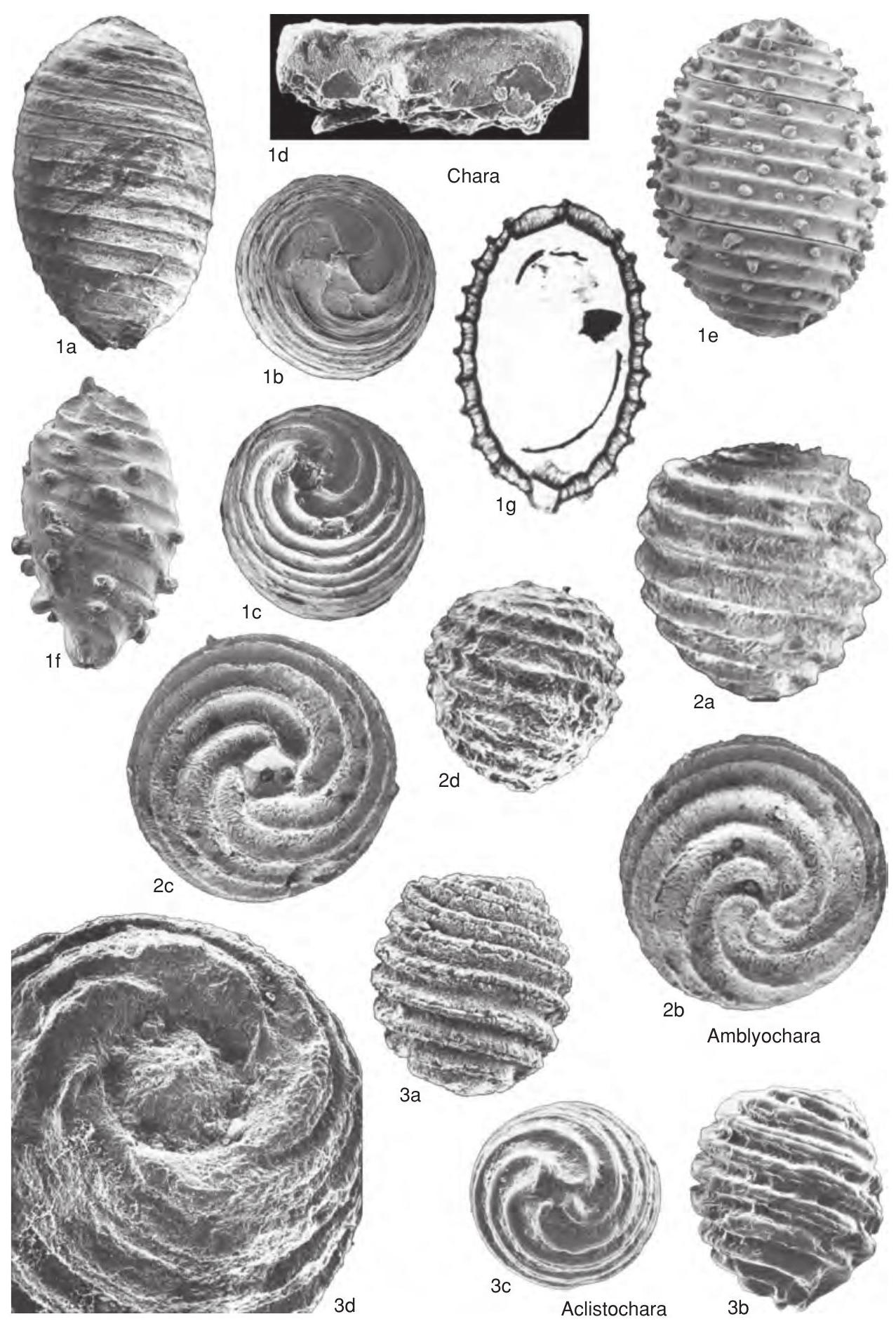Welcome to the Treatise on Invertebrate Paleontology!
Please enter a genera name to retrieve more information.

Aclistochara
Classification
Phylum:
Charophyta
Class:
Charophyceae
Order:
Charales
Suborder:
Charineae
Family:
Characeae
Subfamily:
Charoideae
Formal Genus Name and Reference:
Aclistochara Реск, 1937, p. 86, emend., РЕСК, 1957, p. 24
Type Species:
A. bransoni PECK, 1937, p. 87, pl. 14, 8-11, OD
Images
(Click to enlarge in a new window)
Fig. 64,3a-d. *A. bransoni Peck, Middle Jurassic, USA, topotypes, a, lateral view, C.1212-1, b, lateral view, C.1221-1, c, basal view, C.1221-2, x72, d, apical view, detail, C.1222-1, x130 (new).
Synonyms
Obtusochara, Jurella, Caucasuella, Xinjïangichara
Geographic Distribution
USA, Armenia, Germany, United Kingdom, China, Kazakhstan, Mongolia, Tanzania
Age Range
Beginning Stage in Treatise Usage:
Upper Triassic
Beginning International Stage:
Carnian
Fraction Up In Beginning Stage:
0
Beginning Date:
237
Ending Stage in Treatise Usage:
Upper Cretaceous
Ending International Stage:
Maastrichtian
Fraction Up In Ending Stage:
100
Ending Date:
66.04
Description
Apex lamprothamnoid with deep periapical furrow, Diameter of apical zone varying from 100 to 160 µm, Spirals turn onto truncate apex to form its outer rim, then bend down into central depression, finally turning sharply into center of summit depression and expanding to fill space, horizontal part of apex thin and transparent to swollen and bulbous, General shape of gyrogonite ovoid to ellipsoid, with truncate apex, Spirals smooth, concave to gently convex, Size small, Basal plate generally not described, in some species, basal plate multipartite (LU & LUO, 1990). [Aclistochara resembles Porocharaceae and Raskyellaceae in some respects, the periapical zone with a small diameter and being located within a depression; Aclistochara has an apical opening closed by the calcified tips of the spiral cells, which differs from the Porocharaceae (where this zone is open) and from the Raskyellaceae (where it is closed by an operculum composed of five supplementary cells). Because of similarities in periapical morphology some Aclistochara were referred to Raskyellaceae ( Jurella and Caucasuella KYANSEP-ROMASCHKINA; KYANSEPROMASCHKINA, 1974); or, on the contrary, some Porocharaceae were ascribed to the genus Aclistochara (BHATIA & MANNIKERI, 1977). SCHUDACK (1990) put Obtusochara into synonymy with Aclistochara; however, several species are referable to different genera (Lamprothamnium, Mesochara, Mongolichara), and thus they have not been considered here for the range of Aclistochara.]
References
Museum or Author Information
Classification
Phylum:
Charophyta
Class:
Charophyceae
Order:
Charales
Suborder:
Charineae
Family:
Characeae
Subfamily:
Charoideae
Formal Genus Name and Reference:
Aclistochara Реск, 1937, p. 86, emend., РЕСК, 1957, p. 24
Type Species:
A. bransoni PECK, 1937, p. 87, pl. 14, 8-11, OD
Images
(Click to enlarge in a new window)
Fig. 64,3a-d. *A. bransoni Peck, Middle Jurassic, USA, topotypes, a, lateral view, C.1212-1, b, lateral view, C.1221-1, c, basal view, C.1221-2, x72, d, apical view, detail, C.1222-1, x130 (new).
Synonyms
Obtusochara, Jurella, Caucasuella, Xinjïangichara
Geographic Distribution
USA, Armenia, Germany, United Kingdom, China, Kazakhstan, Mongolia, Tanzania
Age Range
Beginning Stage in Treatise Usage:
Upper Triassic
Beginning International Stage:
Carnian
Fraction Up In Beginning Stage:
0
Beginning Date:
237
Ending Stage in Treatise Usage:
Upper Cretaceous
Ending International Stage:
Maastrichtian
Fraction Up In Ending Stage:
100
Ending Date:
66.04
Description
Apex lamprothamnoid with deep periapical furrow, Diameter of apical zone varying from 100 to 160 µm, Spirals turn onto truncate apex to form its outer rim, then bend down into central depression, finally turning sharply into center of summit depression and expanding to fill space, horizontal part of apex thin and transparent to swollen and bulbous, General shape of gyrogonite ovoid to ellipsoid, with truncate apex, Spirals smooth, concave to gently convex, Size small, Basal plate generally not described, in some species, basal plate multipartite (LU & LUO, 1990). [Aclistochara resembles Porocharaceae and Raskyellaceae in some respects, the periapical zone with a small diameter and being located within a depression; Aclistochara has an apical opening closed by the calcified tips of the spiral cells, which differs from the Porocharaceae (where this zone is open) and from the Raskyellaceae (where it is closed by an operculum composed of five supplementary cells). Because of similarities in periapical morphology some Aclistochara were referred to Raskyellaceae ( Jurella and Caucasuella KYANSEP-ROMASCHKINA; KYANSEPROMASCHKINA, 1974); or, on the contrary, some Porocharaceae were ascribed to the genus Aclistochara (BHATIA & MANNIKERI, 1977). SCHUDACK (1990) put Obtusochara into synonymy with Aclistochara; however, several species are referable to different genera (Lamprothamnium, Mesochara, Mongolichara), and thus they have not been considered here for the range of Aclistochara.]
